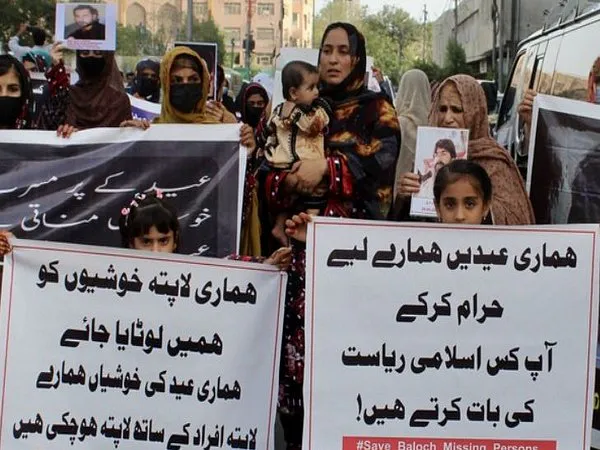Amnesty International on Thursday called upon Pakistani authorities to immediately end their crackdown on peaceful protests by families seeking justice for the enforced disappearance of their loved ones, and said that enforced disappearance is a serious violation of international human rights law and a crime under international law.
In a report titled, ‘Braving the Storm: Enforced Disappearances and the Right to Protest’, the human rights watchdog said the government should immediately inform all detainees of the reasons for their arrest or detention and provide them with full information about their rights, including prompt access to a lawyer to challenge the legality of their detention.
The report documented the state’s use of harassment, intimidation, and even violence, to stifle peaceful protests by families of the disappeared. Many families turn to public demonstrations to pressure authorities to release their loved ones or for information about their whereabouts, having exhausted all means of redress through the justice system, it said.
According to the Human Rights watchdog, Pakistan’s intelligence services have routinely used enforced disappearance to target human rights defenders, political activists, students, and journalists, with the fate of hundreds of victims still unknown.
The incidents described to Amnesty International indicate that police and intelligence agents have used unnecessary force to disperse peaceful protests – in breach of international human rights laws and standards, it said.
In a statement, Deputy Regional Director for South Asia at Amnesty International, Dinushika Dissanayake, said, “Families of the disappeared are constantly let down by authorities through their lack of access to justice, the ineptitude of the Commission of Inquiry on Enforced Disappearances and the failure of state institutions to hold perpetrators to account or even provide any answers.”
“The injustice is only compounded by the cruel and callous treatment meted out to these families when they protest. The crackdown on the right to peaceful protest must end immediately,” Dissanayake added.
Amnesty International also documented unlawful charges being brought against protesters for “blocking the road” or “disobeying the law” for participating in a peaceful protest in an attempt to discourage them from campaigning.
“The government should also ensure that investigation, and any prosecutions, are not limited to direct perpetrators but also address the criminal liability of those suspected of ordering, soliciting, planning, instigating, conspiring to commit, aiding or abetting, or otherwise assisting or facilitating the commission of such crimes, as well as superiors who knew or should have known that a subordinate was committing or about to commit a crime but did not take all the reasonable and necessary measures within their power to prevent, repress or punish the crime,” the report says.
On the right to peaceful assembly of people, Amnesty asked the government to facilitate and guarantee the right to freedom of peaceful assembly of people in protest rallies without discrimination.
“In some cases, the authorities have also resorted to arbitrary arrests and detention to discourage peaceful protests and stop people from gathering to exercise their right to freedom of peaceful assembly. The government should not use arbitrary detention, the registration of FIRs against peaceful protesters, and arrest of people for simply exercising their right to peaceful protest, the watchdog said.
“Amnesty International also reiterates its long-standing call to the Government of Pakistan to stop the practice of enforced disappearances and outlaw it entirely. Pakistan must also accede to the International Convention for the Protection of All Persons from Enforced Disappearance (CED).”
The issue of forced disappearance in Pakistan originated during the Musharraf era (1999 to 2008), but the practice continued during subsequent governments.
Pakistani authorities, including law enforcement agencies and the criminal justice system, have long failed to demonstrate the political will to end enforced disappearances. Human rights activists allege that the law enforcement agencies in Pakistan are responsible for the cases of forced disappearance in Pakistan.
Enforced disappearances are used as a tool by Pakistani authorities to terrorize people who question the all-powerful army establishment of the country, or seek individual or social rights. Cases of enforced disappearances have been majorly recorded in the Balochistan and the Khyber-Pakhtunkhwa provinces of the country which host active separatist movements.

